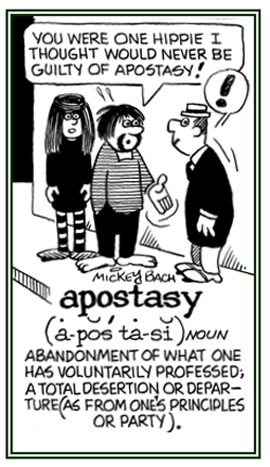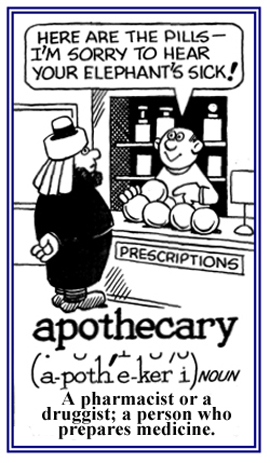apo-, ap-, aph-
(Greek: from, away from, asunder, separate, separation from, derived from)
apoplectic (adjective), more apoplectic, most apoplectic
1. Pertaining to or suffering from a stroke or a sudden loss of physical control or consciousness: Joe's mother had an apoplectic attack which was caused when a blood vessel in her brain ruptured or became blocked.
2. Conveying extreme anger: When anyone is very upset or greatly disturbed, he or she or she is considered as someone who is having an apoplectic reaction to something that really bothering him or her.
3. Etymology: from Latin apoplecticus and Greek apoplektikos; from apoplessein, "to be disabled with a stroke".
2. Conveying extreme anger: When anyone is very upset or greatly disturbed, he or she or she is considered as someone who is having an apoplectic reaction to something that really bothering him or her.
3. Etymology: from Latin apoplecticus and Greek apoplektikos; from apoplessein, "to be disabled with a stroke".
apoplexia (s), apoplexias (pl) (noun forms)
Loss of consciousness as a result of an effusion of blood or other lesion within the substance of the brain; but it is sometimes extended to indicate an effusion of blood into the substance of any organ; such as, apoplexia of the lungs.
1. A term for a "stroke", a cerebrovascular accident (CVA), often associated with loss of consciousness and paralysis of various parts of the body.
2. Sudden impairment of neurological function; especially, something resulting from a cerebral hemorrhage.
3. Any acute clinical event, related to impairment of cerebral circulation, which lasts longer then twenty-four hours; brain attack.
4. A sudden effusion of blood into an organ or tissue.
5. A fit of extreme anger; rage.
6. Etymology: apoplexy comes from the Greek apoplexia, "a seizure", in the sense of being "struck down".
2. Sudden impairment of neurological function; especially, something resulting from a cerebral hemorrhage.
3. Any acute clinical event, related to impairment of cerebral circulation, which lasts longer then twenty-four hours; brain attack.
4. A sudden effusion of blood into an organ or tissue.
5. A fit of extreme anger; rage.
6. Etymology: apoplexy comes from the Greek apoplexia, "a seizure", in the sense of being "struck down".
In Greek, plexe is "a stroke". The ancients believed that anyone suffering a stroke; or any sudden incapacity, had been struck down by the gods.
Also, from from Old French apoplexie, "a sudden fit of paralysis and dizziness"; or directly from Late Latin apoplexia; from apo-, "off" + plessein, "to hit".
aporrhysa
aposematic (adjective), more aposematic, most aposematic
1. A description of natural colors and bright markings on an animal that warn predators that it is poisonous.
2. Colored or constructed in a way that indicates special capabilities for defense: Aposematic signals are beneficial for both the predator and prey, who both try to avoid any potential harm.
2. Colored or constructed in a way that indicates special capabilities for defense: Aposematic signals are beneficial for both the predator and prey, who both try to avoid any potential harm.
aposiopesis
In rhetoric, a sudden interruption of a thought in the middle of a sentence, as if the speaker were unable or unwilling to continue.
aposiopetic
A reference to a sudden interruption of a thought in the middle of a sentence.
apositia
1. Lacking appetite; a loathing of food; also, anorexia.
2. A dislike of or distaste for food.
2. A dislike of or distaste for food.
The rejection of or the abandonment of a religious belief, a political party, or certain principles: Jacob's apostasy was a disappointment for his mother because he no longer belonged to the devotional organization that he had been a member of ever since he was a child.

© ALL rights are reserved.
Go to this Word A Day Revisited Index

Go to this Word A Day Revisited Index
so you can see more of Mickey Bach's cartoons.
apostaxis
1. A slight hemorrhage.
2. Slight bleeding; bleeding by drops.
2. Slight bleeding; bleeding by drops.
apostrophe
A dread of being around people who have an amputation or a fear that one will lose an appendage: Jane became afflicted with apotemnophobia because she was afraid and terrified of saying the wrong thing or acting in the wrong way when encountering such a handicapped person.
apothanasia
The lengthening or extension of life; postponement of death, as opposed to euthanasia.
1. A drugstore or a place where prescriptions can be filled and where they are stored: Brent went to the apothecary to talk to the druggist about some medical drugs that might diminish his headache.
2. Etymology: "shopkeeper, especially one who stores, compounds, and sells medicaments"; from Old French apotecaire; Modern French apothicaire; from Late Latin apothecarius, "storekeeper"; from Latin apotheca, "storehouse"; which came from Greek apotheke "storehouse". Literally, "a place where things are put away", from apo- "away" + tithenai "to put".

© ALL rights are reserved.
Go to this Word A Day Revisited Index
2. Etymology: "shopkeeper, especially one who stores, compounds, and sells medicaments"; from Old French apotecaire; Modern French apothicaire; from Late Latin apothecarius, "storekeeper"; from Latin apotheca, "storehouse"; which came from Greek apotheke "storehouse". Literally, "a place where things are put away", from apo- "away" + tithenai "to put".

Go to this Word A Day Revisited Index
so you can see more of Mickey Bach's cartoons.
apothegm (APUH them)
Thing uttered.
An apothegm is a succinct, declarative saying that affirms a general truth or doctrine and tends to be more practical in nature than an aphorism: "Nobody, they say, is a hero to his valet" (Goethe).
It is also defined as a terse saying that embodies an important truth, e.g., "Haste makes waste."


